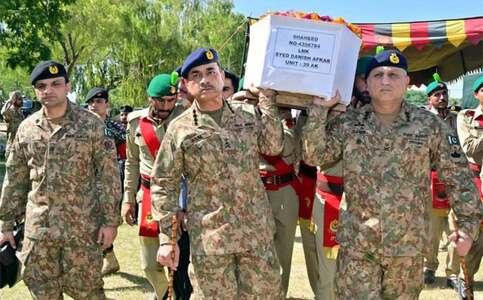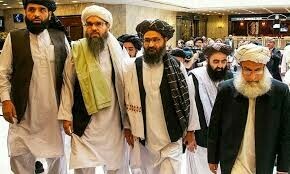ISLAMABAD: The handing down of death sentences to six militants by the military courts was highlighted on Thursday when the Supreme Court suspended their execution.
“Meanwhile the execution of death sentences that have been awarded or would be awarded by the military courts is suspended,” ordered Chief Justice Nasir-ul-Mulk, as he took up an application filed by rights activist Asma Jahangir on behalf of the Supreme Court Bar Association (SCBA).
On April 2, Chief of Army Staff Gen Raheel Sharif had ratified the death sentence awarded to six militants and life imprisonment to one by the military courts.
The military had provided no further information about who these men were, where and when they were picked up, what they were accused and convicted of and where they were tried. It is not even clear if these hangings have been carried out.
These convictions were cited by the petition which asked the SC to stay such hangings. Filed by the SCBA, this application was in addition to the Bar’s challenge to the 21st amendment, which allowed for military courts.
This petition and others have been challenged in a full court of 17 judges. The hearing on Thursday was brief.
The court asked for the latest SCBA application and after short proceedings, ordered that the execution of the military courts’ sentences be halted till the case was decided.
The AG was not able to convince the bench that staying the convictions would mean suspending the entire 21st amendment.
The AG also tried to dispel the impression that the trials were secretive, explaining that legal procedures were followed, including the right of appeal under Section 133(b) of the Pakistan Army Act 1952.
But the court remained concerned that capital punishment had been awarded in a secret manner because the information came to light through the newspapers.
Its concern was that death sentences if carried out were irreversible in case the court ruled against the amendment.
“What will be the outcome of the executions if the court eventually accepts the petitions against the 21st amendment,” the chief justice asked.
“What difference will it make if the executions are implemented after 10 days instead of today,” added Justice Jawwad S. Khawaja, as he also asked the necessity of implementing the punishment immediately.
Asma Jahangir told the court that she could submit affidavits on behalf of the families of the convicts who also claimed that they came to know about the sentencing through the newspapers.
Justice Asif Saeed Khosa recalled the 1999 Supreme Court judgment in the Sheikh Liaquat Hussain case in which special military courts in Sindh established by the then Nawaz Sharif government were declared illegal but after two individuals were executed.
But the unexpected interim order by the Supreme Court was welcomed by the legal experts, who called it historic and unprecedented.
Asma Jahangir pointed out that the interim order may have halted the executions but it did not restrain the military courts from functioning.
“The SCBA had only challenged the death sentences by the military courts because a death sentence is irreversible,” she said.
She added that the Bar did not want to pitch state institutions against each other “but we cannot compromise on the fundamental rights”.
She did not agree that the suspension of executions will adversely affect Pakistan’s war against terrorism.
Advocate Inamur Rahiem, a former member of the JAG branch of the army, described the order as a great achievement.
This has also established that a parallel judicial system manned by non-professionals will not be accepted, he said, adding that terrorists can be awarded a death sentence but only after a fair and transparent trial by competent people.
Former president Rawalpindi High Court Association Sheikh Ehsanuddin called it a historic judgment.
When the petitions challenging the 21st amendment were filed, the SC clubbed them with the already existing petitions to the 18th amendment (which objected to the appointment procedure of the superior court judges) and formed a full bench to hear them.
The case will next be heard on April 22. On that day, Attorney General Salman Aslam Butt will provide the government’s answer.
Published in Dawn, April 17th, 2015
On a mobile phone? Get the Dawn Mobile App: Apple Store | Google Play














































Dear visitor, the comments section is undergoing an overhaul and will return soon.